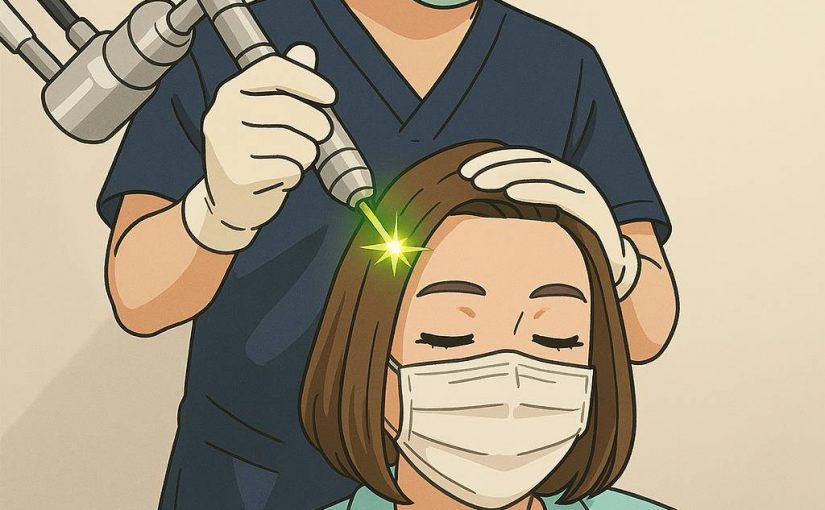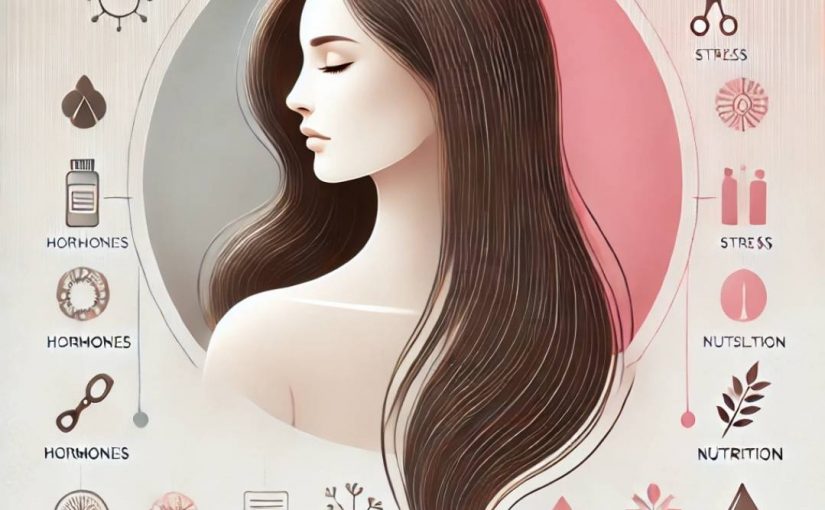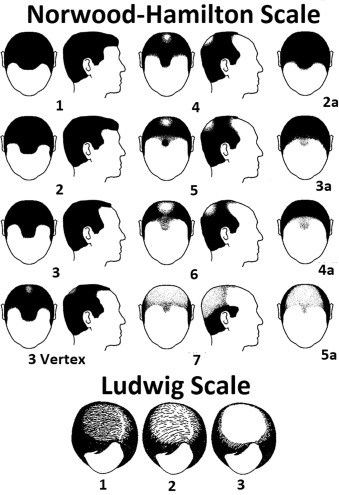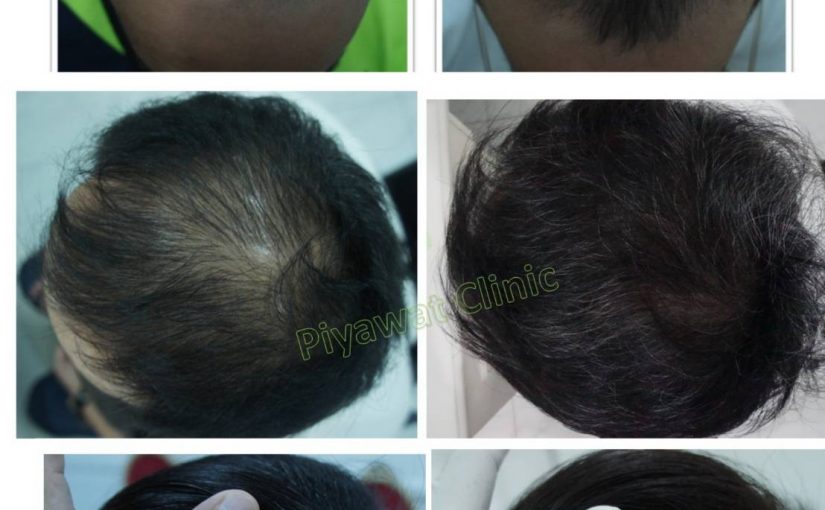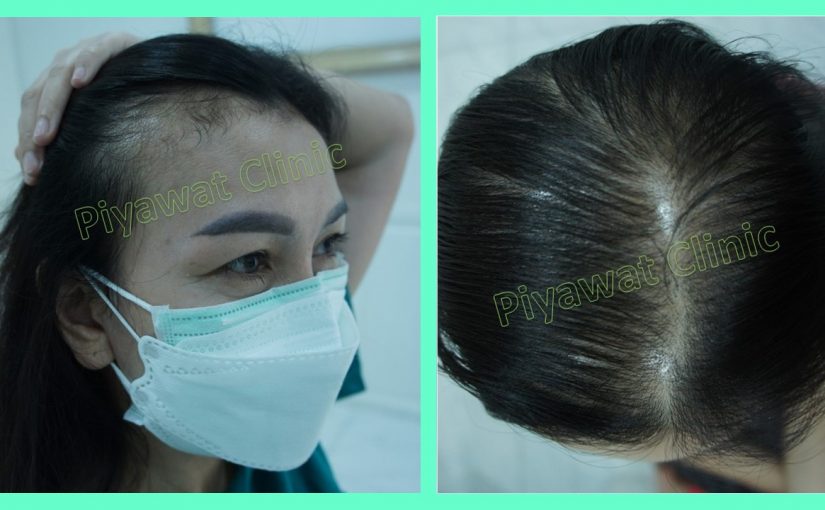กลไกการกระตุ้นเส้นผมด้วย Fractional Laser สำหรับ Androgenetic Alopecia
Androgenetic Alopecia (AGA) หรือภาวะผมบางจากพันธุกรรม เป็นปัญหาที่พบได้บ่อยทั้งในผู้ชายและผู้หญิง มีสาเหตุมาจากฮอร์โมนแอนโดรเจนและความไวของรากผมต่อ DHT (dihydrotestosterone) ซึ่งส่งผลให้วงจรการเจริญเติบโตของเส้นผมสั้นลง และรากผมหดเล็กลงเรื่อย ๆ จนเกิดอาการผมบางอย่างเห็นได้ชัด
ในช่วงหลังมานี้ เทคโนโลยีเลเซอร์ โดยเฉพาะ Fractional Laser ได้รับความสนใจเพิ่มขึ้นในฐานะทางเลือกในการรักษา AGA โดยไม่ใช้ยา เนื่องจากพบว่าเลเซอร์สามารถกระตุ้นให้รากผมที่อ่อนแอฟื้นตัว และกระตุ้นให้เกิดการงอกใหม่ของเส้นผมได้อย่างมีประสิทธิภาพ
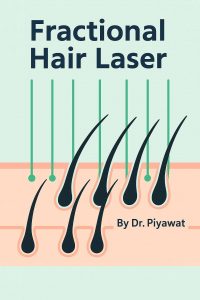
Fractional Laser คืออะไร?
Fractional Laser คือเลเซอร์ที่ปล่อยพลังงานลงไปใต้ผิวหนังเป็นจุดเล็ก ๆ แบบเป็นตาข่าย (fractionated beam) โดยเว้นผิวหนังปกติไว้ระหว่างจุดที่ได้รับพลังงาน ซึ่งจะทำให้เกิดแผลเล็ก ๆ ในระดับไมโครบริเวณที่ยิงเลเซอร์ ส่งผลให้เกิดกระบวนการซ่อมแซมผิวหนังโดยธรรมชาติ และกระตุ้นกระบวนการฟื้นฟูในระดับเซลล์
ประเภทของ Fractional Laser
เลเซอร์ชนิด Fractional ที่ใช้ในการกระตุ้นเส้นผมมีหลายชนิด โดยแต่ละชนิดมีความรุนแรงและระดับประสิทธิภาพที่แตกต่างกัน เนื่องจากผู้ที่มีภาวะผมร่วง ผมบาง มักมีหนังศีรษะที่ไวต่อการกระตุ้น การเลือกใช้เลเซอร์ที่อ่อนโยนจึงเป็นสิ่งสำคัญ เพื่อป้องกันการระคายเคืองหรือผลข้างเคียงต่อหนังศีรษะ
กลไกที่ช่วยกระตุ้นเส้นผม
- การสร้าง Microthermal Zones (MTZs)
Fractional Laser ทำให้เกิดบาดแผลขนาดเล็กระดับไมโครใต้ผิวหนัง หรือที่เรียกว่า Microthermal Zones ซึ่งกระตุ้นให้ร่างกายเข้าสู่กระบวนการซ่อมแซม (wound healing cascade) พร้อมปล่อยสารสื่อกลางต่าง ๆ เช่น growth factors และ cytokines ที่ช่วยกระตุ้นรากผมให้อยู่ในระยะเจริญเติบโต (anagen phase) - กระตุ้นเซลล์ต้นกำเนิด (Stem Cells) รอบรากผม
เลเซอร์สามารถกระตุ้นบริเวณ bulge area ซึ่งเป็นที่อยู่ของ stem cells ภายในรากผม ส่งผลให้เกิดการสร้างเซลล์ใหม่ที่สามารถผลิตเส้นผมใหม่ที่แข็งแรงและมีคุณภาพมากขึ้น - เพิ่มการไหลเวียนเลือดในหนังศีรษะ
ผลของการอักเสบเล็กน้อยที่เกิดจากเลเซอร์ช่วยขยายหลอดเลือดในหนังศีรษะ ทำให้รากผมได้รับออกซิเจนและสารอาหารมากขึ้น เสริมสร้างความแข็งแรงของเส้นผม และช่วยยืดอายุของผมในระยะเจริญเติบโต - เพิ่มการดูดซึมยา และประสิทธิภาพของยาร่วมรักษา
การทำเลเซอร์ก่อนทายาหรือทำเมโสเธอราปี (mesotherapy) ช่วยให้ตัวยาซึมเข้าสู่ผิวหนังได้ดีขึ้น ทำให้การรักษาโดยรวมมีประสิทธิภาพมากขึ้น ตัวยาที่ใช้ควรเลือกให้เหมาะสมกับสภาพหนังศีรษะ โดยเน้นสารสกัดจากธรรมชาติหรือ growth factors ที่ไม่ก่อให้เกิดการระคายเคือง
ใครเหมาะกับการรักษาด้วย Fractional Laser?
- ผู้ที่มีผมบางจากพันธุกรรมทุกระยะ
ไม่ว่าจะอยู่ในระยะเริ่มต้นหรือระยะลุกลาม การใช้ Fractional Laser สามารถช่วยฟื้นฟูรากผมและปรับสมดุลหนังศีรษะได้ - ผู้ที่ต้องการหลีกเลี่ยงผลข้างเคียงจากยารับประทาน
เช่น Finasteride, Dutasteride หรือ Minoxidil ที่อาจก่อให้เกิดผลข้างเคียง Fractional Laser เป็นทางเลือกที่ปลอดภัยและไม่รบกวนระบบฮอร์โมน - ผู้ที่มองหาวิธีการที่ปลอดภัยและไม่ต้องพักฟื้น
Fractional Laser เป็นหัตถการที่ไม่ต้องผ่าตัด ไม่มีบาดแผลเปิด และสามารถใช้ชีวิตตามปกติได้ทันทีหลังทำ - ผู้ที่วางแผนปลูกผมหรือเพิ่งปลูกผม
การทำเลเซอร์ช่วยเร่งการฟื้นตัวของรากผมใหม่ และเพิ่มอัตราการอยู่รอดของเส้นผมที่ปลูก
สรุป
Fractional Laser ไม่เพียงแต่ช่วยฟื้นฟูสภาพผิว แต่ยังเป็นนวัตกรรมที่สำคัญในการรักษาผมร่วงจากพันธุกรรม โดยกระตุ้นกระบวนการซ่อมแซมตามธรรมชาติของร่างกาย กระตุ้นเซลล์ต้นกำเนิด และเพิ่มการไหลเวียนเลือดในหนังศีรษะ ซึ่งล้วนแล้วแต่ส่งผลต่อการงอกใหม่ของเส้นผม
หากได้รับการดูแลอย่างต่อเนื่อง ร่วมกับการใช้ผลิตภัณฑ์ที่เหมาะสมและดูแลสุขภาพหนังศีรษะอย่างครบวงจร จะช่วยให้เส้นผมกลับมาแข็งแรง หนาขึ้น และลดการหลุดร่วงในระยะยาว
ข้อมูลทางคลินิกจากการติดตามผลการรักษาที่ Piyawat Clinic
ผลการติดตามการรักษาที่ Piyawat Clinic พบว่า:
- ผู้ที่ได้รับการรักษาด้วย Fractional Hair Laser ร่วมกับ Meso Hair มีปริมาณเส้นผมเพิ่มขึ้นอย่างมีนัยสำคัญทางสถิติ เมื่อเทียบกับผู้ที่ได้รับการรักษาด้วย Meso Hair เพียงอย่างเดียว
- ผู้ที่ได้รับการรักษาด้วย Fractional Hair Laser ร่วมกับ Meso Hair มีการงอกของเส้นผมใหม่ในบริเวณที่ไม่มีรูขุมขนเดิม (ช่องว่างระหว่างรูขุมขน) มากกว่ากลุ่มที่ทำ Meso Hair เพียงอย่างเดียว อย่างมีนัยสำคัญทางสถิติ
